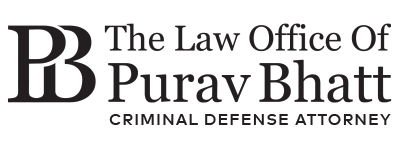Everyone makes mistakes. A momentary lapse in judgment can cause you to do something you should not, as a result of which you might end up with a criminal record. The problem with having a criminal record is that even after paying for your mistake, your record can continue to haunt you for the rest of your life.
If you have an arrest or conviction on your record and if it’s causing you problems with employment, housing, professional licensing and certification, and other aspects of life, you can benefit greatly from sealing or expunging your record.
At the Law Office of Purav Bhatt, we believe in second chances. We believe that someone who has paid for their mistakes should be able to lead a normal life and contribute to society. For over a decade, we have been defending and fighting for the rights and civil liberties of individuals facing misdemeanor and felony charges. We have also helped countless individuals seal and expunge their criminal records so that they can wipe the slate clean and make a fresh start.
Contact us today at 773-791-9682 to talk to a profound and proven Chicago expungement attorney from our firm.
Understanding Criminal Records and How They Can Impact Your Life
A criminal record is essentially a document that details your criminal history. It’s commonly referred to as a RAP (Record of Arrests and Prosecutions) sheet. It contains a wide range of information including:
- The date on which you were arrested
- The criminal offense you were charged with
- Your case number
- Disposition or sentence (the outcome of your case)
- Other details like Central Booking (CB) number, Document Control Number (DCN), Individual Record (IR) number, and State Identification (SID) number
👉Also read: Learning The Basics Of Money Laundering Charges: What You Need To Know
How a Criminal Record Can Impact Your Life
Employment Opportunities
Having a criminal record can disqualify you from certain government jobs as well as several jobs in the private industry. Depending on your employment contract, your employer might be able to terminate you in the event of a criminal conviction. In short – even if you are otherwise fully qualified, a criminal record can prevent you from getting the employment opportunities you deserve.
Educational Opportunities
Having a criminal record can disqualify you from applying for certain graduate programs at certain universities. It can also disqualify you from applying for certain loans, grants, federal work study programs, and other types of financial assistance and employment opportunities available for students.
Licensing and Certifications
A criminal record can disqualify you from getting certain professional certifications and licenses that you might need to get ahead in your career.
Loans
A criminal record can disqualify you from applying for certain loans from public as well as private owned institutions. Even if you are offered a loan, you might have to pay a higher interest rate compared to those who do not have a criminal record.
Housing
A criminal record can make it harder for you to rent or lease a property of your choice. Although the Just Housing Amendment (JHA) prohibits landlords in Cook County from discriminating against potential tenants with a criminal record, you might still find it difficult to rent or lease a place in a good neighborhood compared to those who do not have a criminal record.
Insurance Rates
A criminal conviction can affect your insurability, as the insurance company might consider you as a high-risk applicant. As a result, you might have to pay higher insurance premiums than you otherwise might have to.
Difference Between Expungement and Criminal Record Sealing in Illinois
Expungement is a process that allows you to completely erase your arrest and conviction records. Record sealing, on the other hand, is a process that allows you to seal your arrest and conviction records and make them private so that they are not accessible to the general public.
How Does Expungement Work in Illinois?
Your Chicago expungement attorney will file a petition with the Circuit Clerk in the county where you were arrested and/or convicted. If you were arrested and/or convicted in more than one county, your attorney will file a petition with the Circuit Clerk in each of those counties.
If your request for expungement is granted, the Clerk’s Office will remove your name and other information from their docket system. Your criminal records will also be erased from the database of the police department that arrested you, the Illinois State Police, and the FBI (if you were arrested or convicted of a federal crime). Once it is done, no private individual or business owner can access your criminal records. Only the state police and the Department of Corrections can access an expunged record – that too under limited circumstances.
How Does Record Sealing Work in Illinois?
In order to seal your criminal records, your Chicago record-sealing attorney will file a petition with the Circuit Clerk in the county where you were arrested and/or convicted.
If your request for sealing is granted, the Clerk’s Office will remove your name and other information from their docket system. The arresting police department, Illinois State Police, and the FBI (in case of a federal crime) will seal your criminal records.
It should be noted that law enforcement officials will still have access to your sealed records. Private individuals and business owners, on the other hand, can access your sealed records only if they have a court order.
Qualifying for an Expungement or Record Sealing
Your eligibility for an expungement or record sealing depends on the criminal offense you were arrested and/or convicted of as well as the sentence you received. A knowledgeable Chicago expungement lawyer can evaluate your criminal record and determine whether you can qualify for an expungement or record sealing.
For example, if you were acquitted or if the charges against you were dismissed, you can qualify for an expungement. Similarly, if you were sentenced to qualified probation or court supervision, you can qualify for an expungement as well.
On the other hand, if you were sentenced to regular probation, boot camp, conditional discharge, time considered served, or jail or prison term, you might qualify for record sealing.
It should also be noted that you might have to wait for a certain period of time before filing for an expungement or record sealing – depending on the outcome of your case and the sentence you received.
👉Also read: Defending Yourself Against False Sexual Assault Charges
Criminal Offenses That are Not Eligible for an Expungement or Sealing in Illinois
If you are convicted of DUI, reckless driving, domestic battery, criminal sexual assault, kidnapping, attempted murder, or murder, you cannot get your record expunged or sealed. Similarly, if you are convicted of any crime that requires you to register as a sex offender, you cannot get your record expunged or sealed.
It is important to note that the aforementioned list is not exhaustive. An experienced Chicago expungement attorney can review your arrests and criminal convictions and determine whether you are eligible for an expungement or record sealing.
Can Pending Cases Be Expunged or Sealed in Illinois?
No. If there are criminal charges pending against you, you cannot file for an expungement or sealing. You need to wait for the outcome of your case before you can do so.
How an Experienced Chicago Expungement Lawyer Can Help You?
It’s beneficial for you to hire a Chicago criminal defense attorney who is experienced in handling expungement and record-sealing petitions. A reliable and committed Chicago expungement attorney can review your criminal record and determine whether you can file for an expungement or record sealing. This is someone who has been around the legal corners before and knows what type of danger can be lurking.
Your attorney can file the petition, guide you through the legal process, and make sure you do not make any mistakes or procedural errors that can disqualify your expungement or sealing petition.
If the State Attorney or State Police object to your expungement or sealing petition, your attorney can make the case for granting your request and persuade the court to rule in your favor. Similarly, if your request for expungement or sealing is denied by the court, your attorney can appeal the decision by filing a motion for reconsideration.
👉Also read: Clearing Your Criminal Record: Are You Eligible for Expungement?
Need to Erase Your Criminal Record? Get Our Experienced Chicago Expungement Lawyers on Your Side
The collateral consequences of having an Illinois criminal record cannot be overstated. Even if you have paid your dues for the mistakes you made in the past, the negative stigma associated with your criminal record can continue to impact your life in more ways than you can imagine.
At the Law Office of Purav Bhatt, we have highly experienced Chicago expungement lawyers who can assess your criminal record, determine whether you qualify for an expungement or record sealing, and take the necessary steps to get your criminal record expunged or sealed.
Our founder – Purav Bhatt – is a highly-rated Chicago criminal defense attorney who is known for his in-depth knowledge of state and federal laws and excellent negotiation skills. Under his guidance, our legal team has helped countless people get their arrest records and conviction records expunged and sealed over the years. We know the process inside and out and we can help you put your criminal past behind you and move on with your life.
Call us today at 773-791-9682 or contact us online to schedule a free consultation with a top-rated Chicago expungement lawyer.







